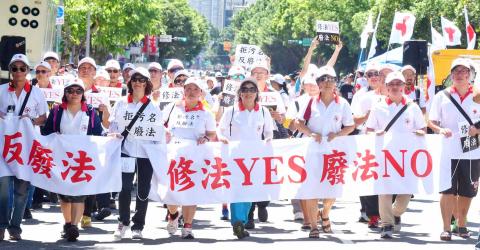Members of the Red Cross Society of the Republic of China yesterday rallied outside the legislature in Taipei to protest against the pan-green camp’s proposals to abolish a special act governing the organization’s operations.
About 300 members from the society’s chapters nationwide participated in the protest, with some coming from Hualien and outlying Kinmen county.
Shouting slogans, the protesters said the law could be amended, but that it must not be nullified, as they called for social “stigma” to be dismissed.

Photo: Liu Hsin-de, Taipei Times
Democratic Progressive Party (DPP) and New Power Party (NPP) legislators have proposed abolishing the Red Cross Society Act of the Republic of China (中華民國紅十字會法) over perceived loopholes they say have made the organization an offshoot of the Chinese Nationalist Party (KMT), created unfair stratification for younger members and allowed it to avoid public scrutiny when appropriating donations.
Several KMT legislators took to the stage to give speeches in support of the society.
KMT Legislator Lai Shyh-bao (賴士葆) said he is against the “lame” political persecution launched by the pan-green camp against the society, adding that all 35 KMT lawmakers would attempt to block the passage of the bill.
KMT Legislator Arthur Chen (陳宜民) said that abolishing the act would be a mistake, as more than 150 nations have promulgated special legislation for the Red Cross.
KMT Legislator Apollo Chen (陳學聖) lauded the society’s efforts to rescue people during emergencies, adding that, with the number of lives the society has saved, its members should go to heaven, but the pan-green camp is attempting to send them to hell.
“I wonder why ‘Big Green’ DPP and ‘Little Green’ NPP are so eager to get rid of you... Society has been inverted. What was good is now evil, and what was evil is now good,” Apollo Chen said.
KMT Legislator Alicia Wang (王育敏) said that the act must not be abolished and the society must not be disbanded, as the organization has served as an important channel for the nation to boost its international space by participating in international relief efforts.
Following a discussion with the DPP caucus in May, the Executive Yuan said that it was positioned to “retain the organization, but abolish the special act.”
Society president Wang Ching-feng (王清峰) said that the Red Cross’ government-appointed directors and supervisors could be removed in the wake of criticism that there are KMT-appointed “guardians” in the organization.
She said if the public does not like the rule allowing the organization’s president to serve unlimited terms, the act could be changed to limit the number of terms the vice president can serve to one.
If the public has doubts over the way donations are spent during emergencies, the act could be amended to include provisions stipulating how the money is to be spent, she added.
Wang Ching-feng said she would request a constitutional interpretation from the Council of Grand Justices if the act is abolished, adding that she would retire if the act is amended or abolished.

Alain Robert, known as the "French Spider-Man," praised Alex Honnold as exceptionally well-prepared after the US climber completed a free solo ascent of Taipei 101 yesterday. Robert said Honnold's ascent of the 508m-tall skyscraper in just more than one-and-a-half hours without using safety ropes or equipment was a remarkable achievement. "This is my life," he said in an interview conducted in French, adding that he liked the feeling of being "on the edge of danger." The 63-year-old Frenchman climbed Taipei 101 using ropes in December 2004, taking about four hours to reach the top. On a one-to-10 scale of difficulty, Robert said Taipei 101

Nipah virus infection is to be officially listed as a category 5 notifiable infectious disease in Taiwan in March, while clinical treatment guidelines are being formulated, the Centers for Disease Control (CDC) said yesterday. With Nipah infections being reported in other countries and considering its relatively high fatality rate, the centers on Jan. 16 announced that it would be listed as a notifiable infectious disease to bolster the nation’s systematic early warning system and increase public awareness, the CDC said. Bangladesh reported four fatal cases last year in separate districts, with three linked to raw date palm sap consumption, CDC Epidemic Intelligence

Taiwanese and US defense groups are collaborating to introduce deployable, semi-autonomous manufacturing systems for drones and components in a boost to the nation’s supply chain resilience. Taiwan’s G-Tech Optroelectronics Corp subsidiary GTOC and the US’ Aerkomm Inc on Friday announced an agreement with fellow US-based Firestorm Lab to adopt the latter’s xCell, a technology featuring 3D printers fitted in 6.1m container units. The systems enable aerial platforms and parts to be produced in high volumes from dispersed nodes capable of rapid redeployment, to minimize the risk of enemy strikes and to meet field requirements, they said. Firestorm chief technology officer Ian Muceus said

MORE FALL: An investigation into one of Xi’s key cronies, part of a broader ‘anti-corruption’ drive, indicates that he might have a deep distrust in the military, an expert said China’s latest military purge underscores systemic risks in its shift from collective leadership to sole rule under Chinese President Xi Jinping (習近平), and could disrupt its chain of command and military capabilities, a national security official said yesterday. If decisionmaking within the Chinese Communist Party has become “irrational” under one-man rule, the Taiwan Strait and the regional situation must be approached with extreme caution, given unforeseen risks, they added. The anonymous official made the remarks as China’s Central Military Commission Vice Chairman Zhang Youxia (張又俠) and Joint Staff Department Chief of Staff Liu Zhenli (劉振立) were reportedly being investigated for suspected “serious